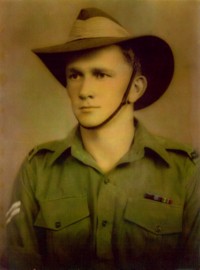- Introduction
The accompanying story is ‘warts and all’. It is the actual memoirs (hand written and transcribed here; but with my headings added) of Corporal Ross Smith, a young Australian man, 18 years of age, from humble circumstances [read more...] who was drawn by World events into the Second World War. He tells it as he saw it. The action takes place near Rabaul in New Britain.

Corporal Ross Smith
At no point does he tell us about his concern for freedom; for the women of his family or for the Australian way of life. These had little or no influence on his decision to join up.
Of course he had deep love and regard for his mother but in his circumstances he had no reason to love ‘existential freedom’ or his Australian way of life.
For some reason the Japanese had decided to attack Australia. They were clearly the aggressors and when someone attacks you, you fight back. They were small, Asian, determined and implacable. They had a strange religion that regarded their Emperor as a God and admired courage, ‘family honour’ and death before surrender.
He came to fear and hate the Japanese and to see their defeat as a ‘job of work’ to be done; and in that there is implicit patriotism, nationalism and not a little xenophobia; all certainly reciprocated by the Japanese soldier.
The story tells us of his desire for something different and exciting in his life; the prospect of adventure; a need to prove himself; to be equal in guts and strength to other men; to carry more than his fair share of the burden; to ‘be there when the whips are cracking!’.
We can speculate that has always been a primary motivation of young soldiers; in the armies of Ozymandias, Alexander the Great, Caesar, Napoleon, Wellington or Haig.
There is initiative in our young man’s preparedness to take risks and break the rules. But at the same time here is a picture of a young man with an underlying respect for authority and the social structure. The officers have a battle plan; and they are to be obeyed without question. For him and his mates the only important thing is the immediate action; the immediate surroundings and the next few hours or days.
Once in action it is kill or be killed. It’s like rabbit hunting at home where he became a 'crack' shot. But now against rabbits that shoot-back and kill your mates; that lay ambushes and booby traps; and torture prisoners. At one point, recalling Tol Plantation, his anger overwhelms us. He still regrets the one that got away.
Maybe the lot of our fighting men and women today is a different. Maybe they each understand the strategic significance of each action and the importance of each objective. Maybe they can make moral judgments ‘on the fly’ and weigh the benefits and necessity of completing an action; or abandoning it because the moral cost is too high or the strategic gain too low.
Maybe they see the enemy for who they are; understand their motivations; understand their fears; and weigh the cost of death, on both sides, against the benefits of future freedoms and new affiliations. We might like to think so. But then, that’s the image we are given when the remember those that ‘gave their lives for freedom’ in many past wars.
We are used to fictionalised war. Stanley Kubrick’s ‘Full Metal Jacket’, like many other movies, attempts to give us a sense of the immediacy, chaos and surreal disconnectedness of battle. Full Metal Jacket is the story of a single action during the Battle of Hue in Vietnam but was not shot there. We recently visited the actual site and were struck by the waste of lives on both sides to reach the present, rather lovely, outcome. But I was also struck by the realisation that this present is entirely contingent on that history; just as it was.
And so it was in New Guinea. Each act of bravado; each bout of malaria; each bullet’s flight; was essential to our young man’s survival and to the circumstances of his future. In due course this future led to a chance meeting with Joan at Luna Park in Sydney; to their courtship and marriage; then to the birth and nurture of their children and so on; to grandchildren and great-grandchildren.
But unlike the movies this story is not fiction; except insofar as it is seen from a particular perspective; through the prism of memory. I hope you find it as interesting as I do.
